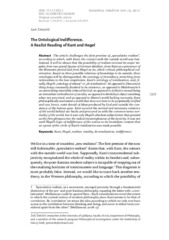The Ontological Indifférence. A Realist Reading of Kant and Hegel
Апстракт
The article challenges the first premise of „speculative realism“, according to which, with Kant, the contact with the outside world was lost. Instead, it will be shown that the possibility of realism received its major impulse from two grand figures of German Idealism, from Kant as a precursor of the Romantic period and from Hegel as its, albeit critical, philosophical culmination. Based on three possible relations of knowledge to its outside, three ontologies will be distinguished, the ontology of immediacy, stretching from rationalists to the last empiricists, Kant’s ontology of totalization, and, finally, Hegel’s „ontology of release“or ,,de-totalization“. As opposed to Descartess thing being constantly doubted in its existence, as opposed to Malebranches occasion being invariably induced by God, as opposed to Leibnizs monad being an immediate embodiment of an idea, as opposed to Berkeley’s object vanishing when not perceived, and as opposed to Humes world lacking necessity, Kant p...hilosophically warranted a world that does not have to be perpetually verified and can, hence, exist devoid of ideas produced by God and outside the constancy of the human gaze. Kant secured the normal and necessary existence of the world behind our backs and procured us with the common-sense normality of the world, but it was only Hegel’s absolute subjectivism that granted us the first glimpses into the radical meaninglesness of the facticity. It was not until Hegel’s logic of indifférence of the notion to its immediate content that an egress of the circle of Kant’s totalization was made possible.
Кључне речи:
Kant, Imanuel / Hegel, Georg Vilhelm Fridrih / realism / totality / de-totalizationИзвор:
Filozofija i društvo / Philosophy and Society, 2015, 369-391Издавач:
- Beograd : Institut za filozofiju i društvenu teoriju
Институција/група
IFDTTY - JOUR AU - Simoniti, Jure PY - 2015 UR - http://rifdt.instifdt.bg.ac.rs/123456789/309 AB - The article challenges the first premise of „speculative realism“, according to which, with Kant, the contact with the outside world was lost. Instead, it will be shown that the possibility of realism received its major impulse from two grand figures of German Idealism, from Kant as a precursor of the Romantic period and from Hegel as its, albeit critical, philosophical culmination. Based on three possible relations of knowledge to its outside, three ontologies will be distinguished, the ontology of immediacy, stretching from rationalists to the last empiricists, Kant’s ontology of totalization, and, finally, Hegel’s „ontology of release“or ,,de-totalization“. As opposed to Descartess thing being constantly doubted in its existence, as opposed to Malebranches occasion being invariably induced by God, as opposed to Leibnizs monad being an immediate embodiment of an idea, as opposed to Berkeley’s object vanishing when not perceived, and as opposed to Humes world lacking necessity, Kant philosophically warranted a world that does not have to be perpetually verified and can, hence, exist devoid of ideas produced by God and outside the constancy of the human gaze. Kant secured the normal and necessary existence of the world behind our backs and procured us with the common-sense normality of the world, but it was only Hegel’s absolute subjectivism that granted us the first glimpses into the radical meaninglesness of the facticity. It was not until Hegel’s logic of indifférence of the notion to its immediate content that an egress of the circle of Kant’s totalization was made possible. PB - Beograd : Institut za filozofiju i društvenu teoriju T2 - Filozofija i društvo / Philosophy and Society T1 - The Ontological Indifférence. A Realist Reading of Kant and Hegel SP - 369 EP - 391 DO - 10.2298/FID1502369S ER -
@article{
editor = "Jovanov, Rastko",
author = "Simoniti, Jure",
year = "2015",
abstract = "The article challenges the first premise of „speculative realism“, according to which, with Kant, the contact with the outside world was lost. Instead, it will be shown that the possibility of realism received its major impulse from two grand figures of German Idealism, from Kant as a precursor of the Romantic period and from Hegel as its, albeit critical, philosophical culmination. Based on three possible relations of knowledge to its outside, three ontologies will be distinguished, the ontology of immediacy, stretching from rationalists to the last empiricists, Kant’s ontology of totalization, and, finally, Hegel’s „ontology of release“or ,,de-totalization“. As opposed to Descartess thing being constantly doubted in its existence, as opposed to Malebranches occasion being invariably induced by God, as opposed to Leibnizs monad being an immediate embodiment of an idea, as opposed to Berkeley’s object vanishing when not perceived, and as opposed to Humes world lacking necessity, Kant philosophically warranted a world that does not have to be perpetually verified and can, hence, exist devoid of ideas produced by God and outside the constancy of the human gaze. Kant secured the normal and necessary existence of the world behind our backs and procured us with the common-sense normality of the world, but it was only Hegel’s absolute subjectivism that granted us the first glimpses into the radical meaninglesness of the facticity. It was not until Hegel’s logic of indifférence of the notion to its immediate content that an egress of the circle of Kant’s totalization was made possible.",
publisher = "Beograd : Institut za filozofiju i društvenu teoriju",
journal = "Filozofija i društvo / Philosophy and Society",
title = "The Ontological Indifférence. A Realist Reading of Kant and Hegel",
pages = "369-391",
doi = "10.2298/FID1502369S"
}
Jovanov, R.,& Simoniti, J.. (2015). The Ontological Indifférence. A Realist Reading of Kant and Hegel. in Filozofija i društvo / Philosophy and Society Beograd : Institut za filozofiju i društvenu teoriju., 369-391. https://doi.org/10.2298/FID1502369S
Jovanov R, Simoniti J. The Ontological Indifférence. A Realist Reading of Kant and Hegel. in Filozofija i društvo / Philosophy and Society. 2015;:369-391. doi:10.2298/FID1502369S .
Jovanov, Rastko, Simoniti, Jure, "The Ontological Indifférence. A Realist Reading of Kant and Hegel" in Filozofija i društvo / Philosophy and Society (2015):369-391, https://doi.org/10.2298/FID1502369S . .



